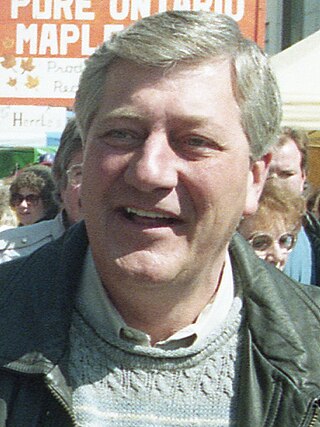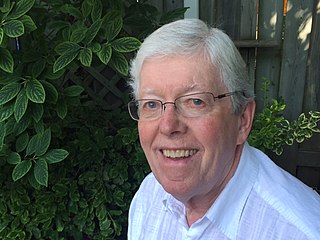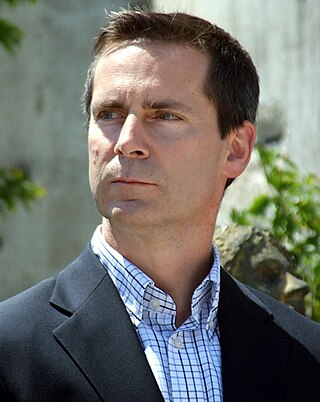Related Research Articles

The 1993 Canadian federal election was held on October 25, 1993, to elect members to the House of Commons of the 35th Parliament of Canada. Considered to be a major political realignment, it was one of the most eventful elections in Canada's history. Two new regionalist parties emerged, finishing second and third in seat count. Most notably, the election marked the worst defeat for a governing party at the federal level and among the worst ever suffered by a governing party in the Western democratic world. In a landslide, the Liberal Party, led by Jean Chrétien, won a majority government.

The Ontario New Democratic Party is a social democratic political party in Ontario, Canada. The party currently forms the Official Opposition in Ontario following the 2018 general election. It is a provincial section of the federal New Democratic Party. It was formed in October 1961 from the Co-operative Commonwealth Federation and the Ontario Federation of Labour (OFL).

The 1968 Canadian federal election was held on June 25, 1968, to elect members of the House of Commons of Canada of the 28th Parliament of Canada.

Irene R. Mathyssen is a Canadian politician and was a Member of Parliament in the House of Commons of Canada from 2006 until 2019. She was previously a New Democratic Party Member of Provincial Parliament (MPP) in Ontario from 1990 to 1995, and briefly served as a minister in the government of Premier Bob Rae.
Walter Cocksmith Weir was a Canadian politician. Weir served as the 15th premier of Manitoba from 1967 to 1969.

The 2007 Ontario general election was held on October 10, 2007, to elect members (MPPs) of the 39th Legislative Assembly of the Province of Ontario, Canada. The Liberals under Premier Dalton McGuinty won the election with a majority government, winning 71 out of a possible 107 seats with 42.2% of the popular vote. The election saw the third-lowest voter turnout in Ontario provincial elections, setting a then record for the lowest voter turnout with 52.8% of people who were eligible voted. This broke the previous record of 54.7% in the 1923 election, but would end up being surpassed in the 2011 and 2022 elections.

The 1995 Ontario general election was held on June 8, 1995, to elect members of the 36th Legislative Assembly of the province of Ontario, Canada. The writs for the election were dropped on April 28, 1995.

The 1990 Ontario general election was held on September 6, 1990, to elect members of the 35th Legislative Assembly of the province of Ontario, Canada. The governing Ontario Liberal Party led by Premier David Peterson was unexpectedly defeated. Although the Peterson government, and Peterson himself, were very popular, he was accused of opportunism in calling an election just three years into his mandate. In a shocking upset, the New Democratic Party (NDP), led by Bob Rae, won a majority government. This marked the first time the NDP had won government east of Manitoba, and to date the only time the NDP formed the government in Ontario.

David Samuel Horne MacDonald is a Canadian United Church of Canada minister, former politician, and author.
James Perry Wiseman is a former Canadian politician in Ontario. He was a New Democratic Party member of the Legislative Assembly of Ontario from 1990 to 1995.
Evelyn Adelaide Gigantes is a former politician in Ontario, Canada. She served as a New Democratic Party member of the Legislative Assembly of Ontario on three occasions between 1975 and 1995 and was a prominent cabinet minister in the government of Bob Rae.

Oshawa is a federal electoral district in Ontario, Canada, that is represented in the House of Commons of Canada. It currently consists of the City of Oshawa south of Taunton Road. Historically, the riding was dominated by a working-class electorate.
York South was a provincial riding in Ontario, Canada, that was represented in the Legislative Assembly of Ontario from 1926 to 1999.

The 2011 Ontario general election was held on October 6, 2011, to elect members of the 40th Legislative Assembly of Ontario. The Ontario Liberal Party was elected to a minority government, with the Progressive Conservative Party of Ontario serving as the Official Opposition and the Ontario New Democratic Party (NDP) serving as the third party. In the final result, Premier McGuinty's party fell one seat short of winning a majority government.

The 2011 Canadian federal election was held on May 2, 2011, to elect members to the House of Commons of Canada of the 41st Canadian Parliament.

The 2014 Ontario general election was held on June 12, 2014, to elect the members of the 41st Parliament of Ontario. The Liberal Party won a majority of seats in the legislature, allowing its leader, Kathleen Wynne, to continue as premier, moving from a minority to majority government. This was the Liberals' fourth consecutive win since 2003 and an improvement from their performance in the 2011 election. The Progressive Conservatives under Tim Hudak were returned to the official opposition; following the election loss, Hudak announced his resignation as Progressive Conservative leader. The New Democratic Party under Andrea Horwath remained in third place, albeit with an improved share of the popular vote.
The 44th Ontario general election is tentatively scheduled to be held on June 4, 2026. As of December 2016, Ontario elections are held on the first Thursday in June in the fourth calendar year following the previous general election, unless the Legislative Assembly of Ontario is dissolved earlier by the Lieutenant Governor of Ontario due to advice from the Premier of Ontario, a motion of no confidence or the failure of the Assembly to grant supply. Such a dissolution is unlikely as the current government has a majority.
This article is about polls leading up to the 1984 Canadian federal election.
This article is about polls leading up to the 1979 Canadian federal election.
This article is about polls leading up to the 1972 Canadian federal election.
References
- ↑ "Trudeau far in front". The Ottawa Citizen. June 22, 1968. p. 1.
- 1 2 3 "Liberals slipping". The Ottawa Citizen. June 8, 1968. p. 1.
- ↑ "Stanfield carrying Tories high". The Ottawa Citizen. January 13, 1967. p. 7.
- 1 2 "Liberals have that sinking feeling". The Ottawa Citizen. October 27, 1967. p. 6.
- 1 2 3 4 "Is NDP tide starting to turn". The Ottawa Citizen. May 15, 1967. p. 7.
- ↑ "Canadian voters do soul-searching". The Ottawa Citizen. August 2, 1966. p. 7.
- ↑ "Parties stand still". The Ottawa Citizen. May 14, 1966. p. 7.
- ↑ "Liberals, NDP stronger". The Ottawa Citizen. March 5, 1966. p. 7.
- ↑ "Poll at Fort William shows Tory advance but Liberal victory". The Globe and Mail. June 22, 1968. p. 10.